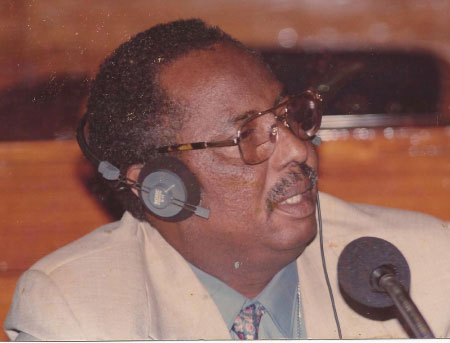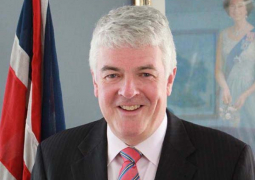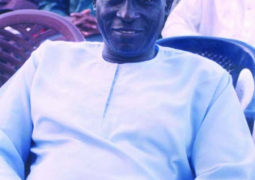
Deyda Hydara was gunned down in cold blood for contributing in meeting the needs and aspirations of the Gambian people and humanity at large, through the discharge of his professional duty as a journalist.
Born on 9 June 1946 at Dobson Street in Banjul, Deyda Hydara was gunned down by unknown assassins on the night of the 13th anniversary of The Point newspaper, the paper he co-founded and for which he served as Managing Editor until his gruesome murder.
In observance of the eleventh anniversary of the assassination of Deyda, media chiefs and heads of The Gambia’s various media houses and colleagues in the media have reiterated their call for proper investigations to be done to bring the culprit(s) to book.
The following are statements by various media chiefs on the occasion of the anniversary:
Samuel (Sam) Sarr – Editor-in-Chief of Foroyaa
It has been 11 years since Deyda Hydara was gunned down. He is somebody with a family and if anybody who is performing his job in peace is shot down in cold blood by somebody in the dark, that should be the concern of every decent human being.
On 16 December 2004 when he was gunned down, all journalists in the country came out in a solidarity march, with Deyda’s photo on the front page of their newspapers to mourn Deyda Hydara.
It was believed by many that in a short while investigations would be conducted and the culprit would be determined and brought to justice, but it has been 11 years now there has been no clue as to who killed him. And the report of the investigation conducted by the NIA has not given any clue into the matter. In fact the ECOWAS Court did affirm this.
In the Deyda Hydara case brought by the family, it has been indicated that serious effort was not made in the conduct of the case itself. That decision was made over a year ago and Government would have intensified its efforts and made it known to the public as to how far they have gone with the investigation or what is being done.
If anything is been done it is not made known to the public; so the assumption is that nothing is being done.
A journalist plays an honourable role in society. Can you imagine what it would be like if on a particular day the media is completely shut down; no newspapers, no television, no radio - no Point, no Observer, no Foroyaa, no Standard, no Voice – what would it be like?
There will be no information or news, and people need information, the public has the right to know what is happening in the world. And the newspapers, the electronic media, other media outlets have the role of holding the Government accountable. This is backed by the constitution.
So if somebody is gunned down while performing that role, that should be the concern of everybody. It has nothing to do with being pro-government or anti-government. It should be the concern of everybody because the messenger who transmits information to the public has been gunned down, taken out of society; so every decent person should be concerned, and the Government has a primary role to play because they are the ones with authority to investigate cases and come to conclusion.
It saddens me, and this is why after 11 years not having any fruitful outcome we need to really talk about it, because if somebody who is performing such an honourable role is even being constrained in any way, it should be a concern.
There should be no restriction on what the person writes or says. There should be no arrest of such person, much more to talk about killing that person.
Somebody who is at that level of editor performing his work, if at all this happened to him we should be deeply concerned.
I think the significance of his murder is the importance of freedom of expression that rings the bell in all of us.
Deyda’s death should be equated to an attack on freedom of expression; that it is something we should intensify in the society. And we as journalists as a whole should ensure that freedom of expression, freedom of the media are actually protected. Even if you are not a journalist, if you have something to say you can say it through the media.
That is how you communicate with the public. And whether they are politicians, artistes or whatever people rely on the media to transmit their message to the public.
So if there is no such freedom for the transmission of information, then that is really a serious matter, which is why I equate the killing of Deyda Hydara to an attack on freedom of expression.
I feel there is a lot of self-censorship in the media in The Gambia because of certain laws which are in place: you have the false publication provision in the criminal code. You also have sedition and libel in the criminal code. So when a journalist writes he tends to curtail what he has to say to avoid being penalised. This is restraining freedom of expression; so eventually when you are doing self-censorship there is constraint, which is not freedom of expression.
Furthermore, if at all a journalist can be arrested at any time on very flimsy things then I feel that is really an attack on freedom of expression.
Draconian media laws on ‘false publication, libel, sedition and spreading false news’ must actually be revoked in our law books. In fact, I am aware that there are attempts to get these laws revoked at the ECOWAS Court. The frequent arrest of journalists must also come to a halt so they can freely express themselves.
Lamin Fatty, Managing Director, StandardNewspaper
The death of Deyda Hydra was unfortunate, particularly being a strong and senior member of the media fraternity. His assassination was quite a mystery, and 11 years now, no one or the perpetrators of his murder have been brought to book. I think we should join hands together as part of the media fraternity to call on the government to double up their effort to ensure that the perpetrators are brought to justice.
We should continue to call on the government to do its utmost to revisit the investigation of the death of Deyda Hydara before next year 16th December, at least to come up with something tangible, so that we will have peace of mind.
Regarding the relationship between the government and the media, I think there should be a cordial relationship between the government and the media because both are bounded by one arm. What we are aspiring for is development, and development cannot take place in the absence of information. The media fraternity also cannot operate without the government creating an environment conducive for them to operate.We are not enemies, but partners in development. I think this is what the media should table out with the government.
I would like to seize the opportunity to advise the GPU to take the lead in building the capacity of young journalists in the media houses in the country.
Pap Saine, The Point’s Managing Editor
Today marks the 11th anniversary of Deyda Hydra’s death and I always remember him because he was my childhood friend and he has done a lot not only for the press, but for The Gambia as a whole; hence I remember him for his good work, dedication, commitment and for his love for press freedom.
He was a gentleman we would never forget, because he had contributed a lot to the development of the press and the country.
Today marks the 11th anniversary since he was assassinated and we pay tribute to him, to his family and to the management and staff of The Point Newspaper.
I continue to pray that his soul would ever rest in perfect peace.
I would also like to take the opportunity to appeal to the Government of The Gambia to make everything possible to revisit the investigation into Deyda Hydra’s death, because he had done everything possible to ensure there is peace and harmony in the press fraternity.
Besides the press, he also contributed in various ways to national development.
For instance, he initiated the construction of fence around Old Jeshwang Cemetery and supported many Gambian youths in the area of education. He was an exemplary role model worthy of emulation.
Therefore, mounting investigation into his murder by the government would boost the image of the country.
We always remember Nyang Sarang Jobe and Ida Jagne who survived in the incident.
I, Hydara and Babucarr Gaye founded the paper in 1991 and in April 1992 Babucarr resigned, and I and Hydara continued to struggle up to his death 11 years ago.
I took over the management of the paper in 2005 and I have made sure the paper comes out daily, which was our desire before his death.
Over the years, the paper has won four international awards namely, John Palm Philip for Press Freedom in 2006 in Germany, another award in 2010 in Vienna by the International Press Institute (IPI). Another award was won by us in 2014 in South Africa by the IPI, and the same year in Zambia by the Post newspapers, which has the largest circulation in their country.
No paper in The Gambia has ever achieved or won such awards.
This is owing to the promotion of divergent views and our level of professionalism in the job.
All these happened thanks to the inspiration of the Management and staff of The Point Newspaper.
The paper is read worldwide and is bilingual (English and French) and is one of the leading papers in the market. It also has international recognition due to its publication of divergent views.
I would like to seize this opportunity on behalf of my partner Mrs Maria Hydara, to thank my dedicated staff for their commitment to the job. Despite the huddles, we have through commitment raised the flag of The Point to higher heights.
I would also like to thank our readership and advertisers for the 24th anniversary of The Point’s existence and for choosing the paper.
I appeal to the Government of The Gambia to open its doors for media access to information and to abolish all draconian media laws that are affecting press freedom in the country, thus making the work of journalists difficult in the country.
We are not enemies of the state, but partners in development.



